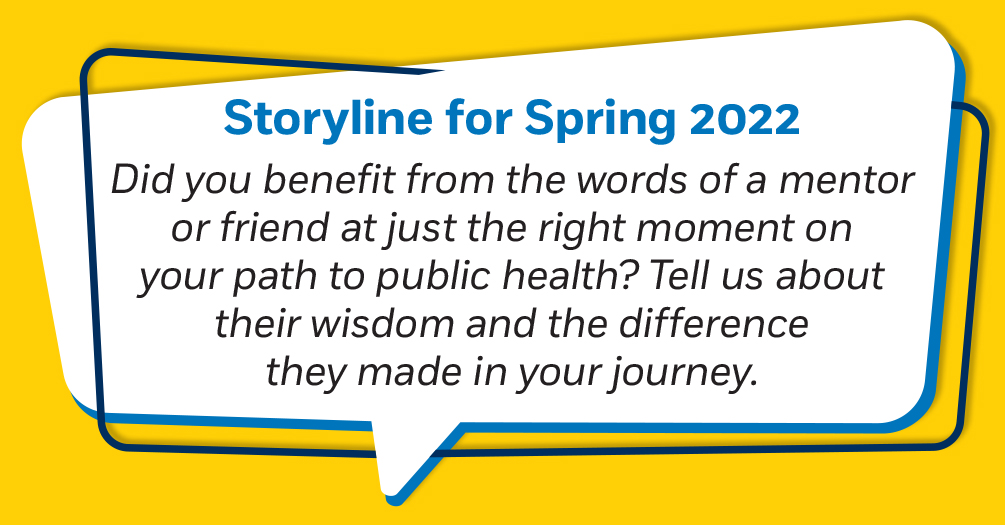Class Notes, In Memoriam, Storyline, and More
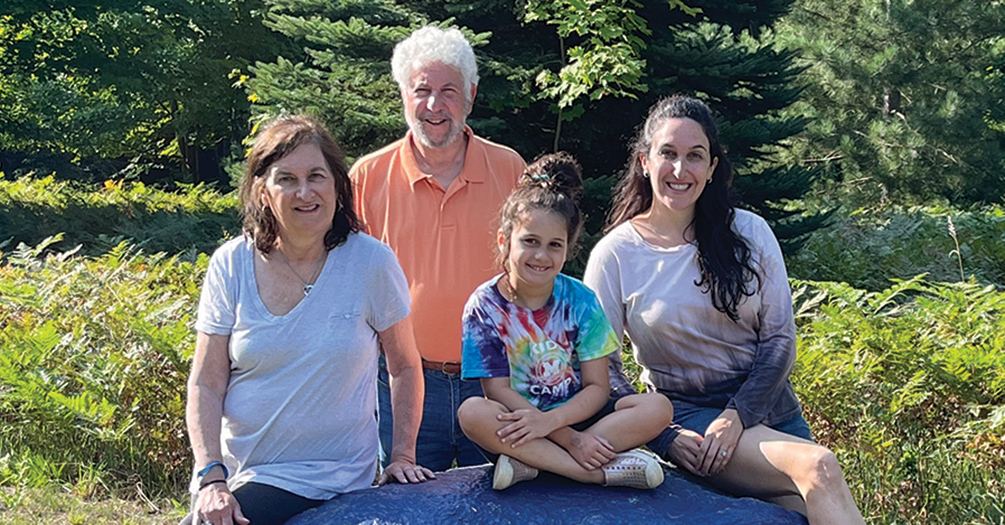
Storyline
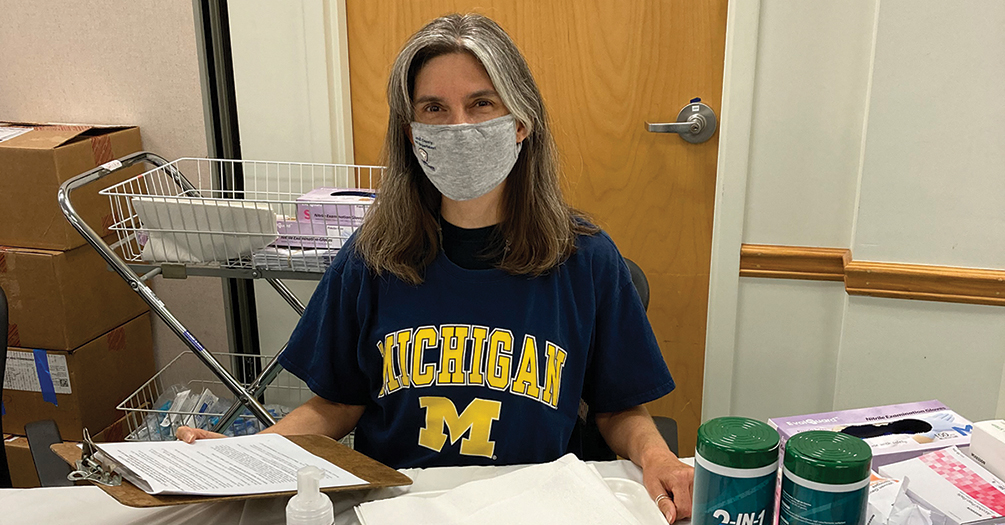
As the health planner and public information officer at the Carroll County Health Department in Maryland, the pandemic has challenged me to use a broad range of skills gained from my studies at Michigan Public Health. Most important is the ability to communicate clearly and compassionately about critical health issues. When COVID-19 vaccines were just becoming available, we got countless calls each day from anxious, frustrated older adults and others at high risk. They all wanted to know one thing: When could they get vaccinated? It was overwhelming at times, but these calls were an opportunity to listen and learn about people in our county and help them understand the rules for Maryland’s vaccine rollout. Breaking things down into clear concepts, explaining what we knew and what we didn’t know, and showing them that someone truly cared helped them stay calm and made our vaccination registration go smoothly. Now we’re on the other end of the process, encouraging people to get vaccinated. Those same communication skills are helping me craft effective messages for traditional and social media, community presentations, and other outreach opportunities to boost our county’s vaccination rates in residents of all ages and backgrounds.
—Maggie LaPietra Kunz, BS ’93, MPH ’96
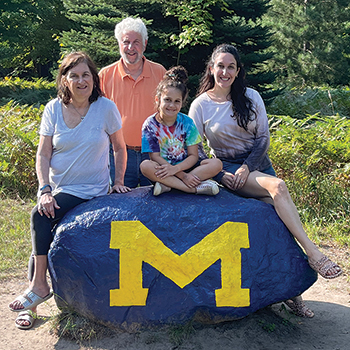
I learned as a student that advances in public health had a greater contribution to increased life span than developments in medicine. That point seemed to be of little more than historical interest in an era where heart attack, cancer, and stroke have replaced infectious diseases as the leading causes of sickness and death. The COVID pandemic, however, has verified that public health measures are, in fact, still paramount to population health. Our most potent defense still is a venerable public health device from the 1918 pandemic: the face mask. The US spent trillions on military defense during the so-called Cold War, yet not a single American life was lost. In 2020, the nation was effectively defenseless against a foe that would kill hundreds of thousands. Even a modicum of expenditures—if allocated to public health—is as valuable, if not more so, as defense spending.
—Kenneth Marcus, MHSA ’78
Thanks to everyone who responded to our Storyline question in the spring issue.
Storyline for Spring 2022
Storyline is a place for any and all alumni of the School of Public Health to share stories with the community by responding to a different question shared in each issue of Findings.
We’ll read all responses and send a brief note of response by email. We’ll also select a few of the responses to publish in the next issue of Findings. All writers whose submission is selected for publication will receive a Michigan Public Health T-shirt.
Tell us your story by January 15, 2022. Submit up to 200 words at publichealth.umich.edu/alumni. Click on Submit to Storyline in the left navigation bar and start sharing!
Letters to the Editor
Capacity Sharing
As a former health official with USAID who served on three continents, I was pleased to read of Robin Martz’s work in emergency response and support of health initiatives in Rwanda. The report noted that USAID cooperation with Rwanda covers a broad range of interventions, from maternal and child health, disease prevention and reproductive health to policy dialogue with Ministry of Health officials. In the same spring 2021 edition, the article by K. Rivet Amico examines the concepts underlying global health, which relate in many ways to Martz’s experience in Rwanda and other developing countries.
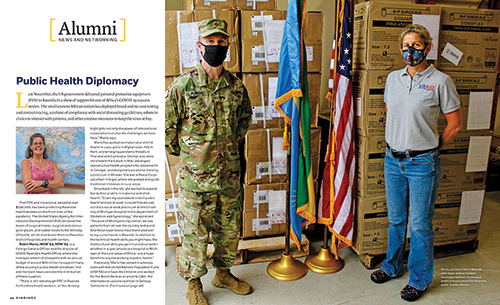
Amico notes that capacity building has long been a pillar of USAID and global health development. I agree with her—it’s time to rethink this approach. In practice, field officers and collaborating partners are deep into capacity sharing while, in practice, the agency still adheres to the concept that one-time investments in education, training, and technical assistance will build sustainable capacity.
As Amico clearly argues, the paradigm of one-sided exchange and one-time intervention obscures the reality that shared learning and continuous examination of change are the hallmarks of lasting results. Too often, the assumption behind global investment is that it’s a 100 percent improvement over what was before. In reality, it’s often the case that some things improve and others do not. It is important to be open to making changes that host governments and ministries support and ensuring that collaboration includes follow-up to document results, respond to unanticipated consequences, and maintain support for change leaders and avenues to continuous refinement. Thank you for sharing these important global health stories.
—Chris McDermott, MHSA ’80
Sharing Findings
Thank you for distributing—digitally as well as in print—the articles from the latest issue of Findings. I took my hard copy to our primary physician at my last regular visit, and he read several of the articles, including the dean’s letter. I’m so happy to be able to point to my Michigan education and the positive impact of the school on current national and international health initiatives.
—Elizabeth Margosches, MPH ’75, PhD ’80
Class Notes
1980s
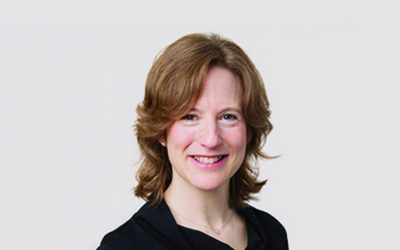
Lori Weiselberg, MPH ’89, took a leave from her position as principal at Health Management Associates late in 2020 to work for Illinois Governor J. B. Pritzker’s COVID-19 vaccination program. She is pleased to share that Illinois was first in the Midwest to reach the milestone of 70 percent of adults vaccinated.
1990s
Jeannine Lynch, MPH ’90, was named vice president of strategy and market access for ReWalk Robotics, a manufacturer of robotic medical devices for individuals with lower limb disabilities. Lynch has worked for biotech industry leaders, held leadership roles in commercial management, and built customized patient services to address rare and ultra-rare medical conditions. She also serves on the board of directors for MVP, a nonprofit that helps young people of color succeed in their education, leadership, and early professional careers. –Thanks to Randel Richner for the Shout Out!
2000s
Terrisca Des Jardins, MHSA ’00, is now the executive director of the Center for Health and Research Transformation (CHRT), an independent nonprofit at the University of Michigan. Prior to joining CHRT, Des Jardins was chief operating officer for the Physician Organization of Michigan Accountable Care Organization.
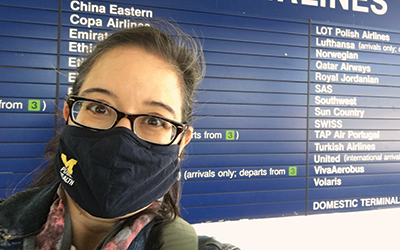
Sandra (Reyes) Ray, MPH ’01, worked as a contractor at the CDC’s quarantine station at O’Hare International Airport in Chicago as part of their COVID-19 and Ebola response teams. Ray’s role consisted of active surveillance, compliance screening, and health education in the international terminal.
2010s
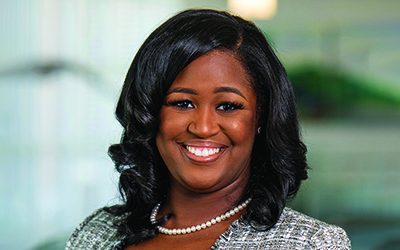
Eboni (Thompson) Buchanan, MHSA ’13, joined Woman’s Hospital Baton Rouge as vice president of Physician Services. She is responsible for the strategic direction and growth of Woman’s physician practices and the continued advancement of clinical services. Buchanan, a Baton Rouge native who was born at Woman’s Hospital, comes to Woman’s from MedStar Health in Washington, D.C., where she served as Senior Director of Women’s and Infants’ Services. She has a wealth of experience, primarily in leading clinical operations and strategy for sub-specialties in health systems across the Washington, D.C., metropolitan area. Buchanan is passionate about the opportunity to help improve the health of women and infants in her home state.
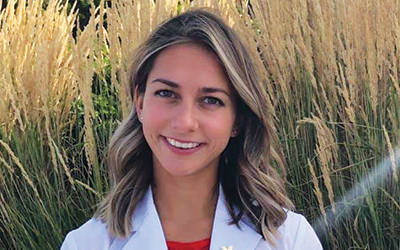
Rylee Doucette, MPH ’19, is a third-year medical student at the University of Wisconsin School of Medicine and Public Health. She uses her public health skills and training regularly to promote health literacy and public hygiene. She recently helped design a health education and health behavior curriculum for a rural orphanage in Thailand and hopes to travel there after the pandemic to support its implementation.
2020s
Dany Zemmel, MPH ’20, is the training and engagement manager for the Region V Public Health Training Center in Ann Arbor, where she leads the development and implementation of the center’s trainings—including webinars and podcasts—and supports student field placement activities.
Keep in Touch
We love hearing from alumni! Did you recently have a baby? Finish your first marathon? Share life changes, job updates, and accomplishments of all kinds. Send photos if you like—especially if they feature Michigan Public Health gear. Most submissions are published as class notes in an upcoming issue of Findings.
We also love it when alumni share great news about other alumni. On the Class Notes page, you can now submit a Shout Out to tell us about other Michigan Public Health alumni doing great things in public health, giving of their time, talents, and passion to the public good, or otherwise living out the school’s mission of pursuing a healthier, more equitable world for all. publichealth.umich.edu/classnotes
Update your contact info at leadersandbest. umich.edu/alumni_update. Or indicate changes on the address label and mail to the address on the back cover.
Looking for a new job or have an opening to fill? Michigan Public Health Careers is the central job, internships, and project-based work posting site for students and graduates. Check out umsphjobs.org or email position openings to [email protected].
In Memoriam
Faculty
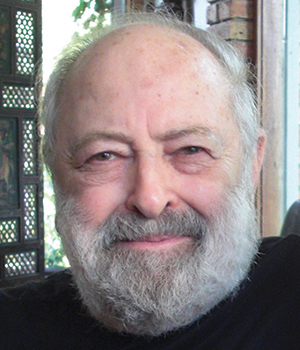
Jason Leonard Finkle, professor emeritus of Population Planning and International Health, died on March 27, 2021, at the age of 94. Finkle received his MA and PhD in Political Science at the University of Michigan and started his teaching career at the University of Florida, later serving as an advisor in Vietnam with Michigan State University and teaching at the University of Southern California. He became an associate professor at the University of Michigan School of Public Health in 1965. That same year, he traveled to India as a consultant with the Ford Foundation, working with the government of India on its family planning program. Returning to Michigan in 1967, he was promoted to professor in 1972. He served as director of the Center for Population Planning and chair of the Department of Population Planning and International Health, publishing prolifically on the global politics of population and reproductive health. In 1984, he initiated the Michigan International Population Fellows Program, funded by the US Agency for International Development, directing it until 1991 and launching dozens of American university graduates in careers in global population, health, and development.
Alumni
1940s
- Lillah I. Olson, MPH ’46 – March 26, 2021
1950s
- Emmett L. Banks, MPH ’58 – May 26, 2021
- Sally C. Madalin, BSPHN ’53 – July 16, 2021
1960s
- Donald K. Freeborn, PhD ’68 – June 12, 2021
- James S. Mattson, MS ’69 – May 27, 2021
- Ann M. McGrath, MPH ’68 – March 27, 2021
- John R. Pratt, MHA ’65 – April 24, 2021
1970s
- Herbert E. Allen, PhD ’74 – June 29, 2021
- Shuh-Jan Chang, MPH ’75 – June 5, 2021
- Valerie A. Glesnes-Anderson, MHSA ’79 – August 8, 2021
- James W. Hudson, MPH ’73 – July 7, 2021
- Betty Jensen, MPH ’70 – July 8, 2021
- Lenore F. Rhodes, MS ’75 – March 25, 2021
- Stephen Strasser, MPH ’74, PhD ’78 – June 19, 2021
1980s
- Barbara W. Faja, MPH ’82 – July 24, 2021
- Scott F. Madden, MHSA ’89 – April 26, 2021
1990s
- James B. D’Arcy, PhD ’94 – June 26, 2021
- Bruce J. Genovese, MHSA ’98 – April 16, 2021
- Leon L. Haley, MHSA ’96 – July 24, 2021
- John W. Hall, MHSA ’90 – March 12, 2021
- Kent M. Helmer, MPH ’90 – April 21, 2021
- Trinh B. Pifer, MPH ’97 – June 6, 2021
2010s
- Nicholas R. Boileau, MPH ’17 – June 19, 2021
- Rebecca A. Copeland, MPH ’21 – July 15, 2021
- David Jones, PhD ’15 – September 11, 2021
- Interested in public health? Learn more today.
- Read “Three Generations, One Passion: When Public Health Runs in the Family.”
- Support research and engaged learning at Michigan Public Health.

